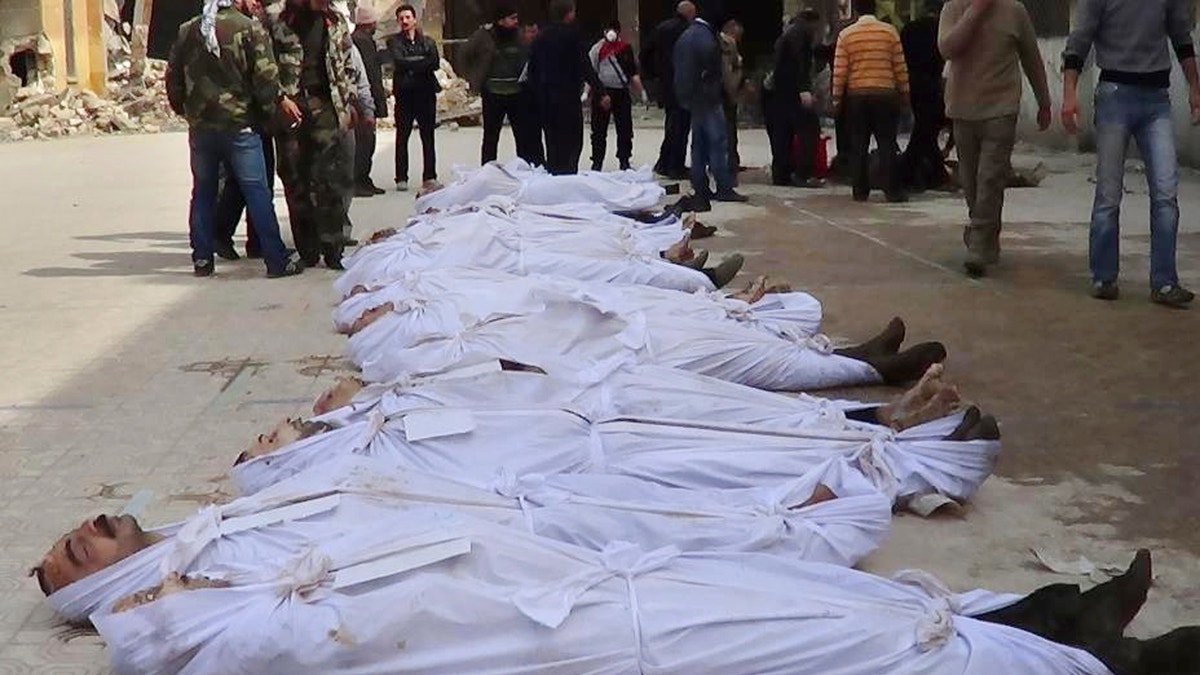
March. 10, 2013 - Syrians standing next to dead bodies that have been pulled from the river near Aleppo's Bustan al-Qasr neighborhood, Syria. (AP)
BEIRUT – Mortar shells struck a Christian neighborhood and a football stadium at game time in Damascus on Monday, killing six civilians and wounding at least 24 in what appeared to be an escalating campaign by rebels to sow fear in the Syrian capital.
Opposition fighters trying to topple Syrian President Bashar Assad have stepped up mortar attacks on Damascus in recent weeks, striking deeper than ever into the heart of the city.
Rebel fighters tried in the past to establish bridgeheads in the capital, but were pushed back to the Damascus suburbs by regime forces. Recent rebel mortar attacks on civilian targets signal a new tactic in trying to loosen Assad's grip on his main stronghold.
In the latest attacks, four mortars hit Bab Sharqi, a predominantly Christian area known for its old churches. One shell fell in a park, two near an ice cream shop and a fourth hit a house nearby, said a government official, speaking on condition of anonymity because he was not authorized to speak to the media.
Six people were killed and 24 wounded, officials said. It was one of the highest death tolls in recent mortar attacks on the capital.
There was no fighting in the area at the time.
A mortar shell also hit the Tishrin football stadium in another neighborhood, the central Barakmeh district, wounding several people during a game, according to the state-run news agency SANA.
Gen. Mowaffak Joumaa, head of the Syrian General Sports Federation, said the mortar landed just off the pitch during the second half of a game, causing light damage. Four players on the bench and a journalist were hurt, he said. They were taken to hospital and were in stable condition.
The Syrian conflict erupted two years ago, initially as a largely peaceful uprising against Assad. In response to a brutal regime crackdown, Assad's opponents took up arms, sparking a civil war. More than 70,000 have been killed and some 4 million -- out of a population of 22 million -- have been forced from their homes by the fighting, according to U.N. estimates.
The fighting has affected most areas of Syria.
"There are no more enclaves of stability in Syria today, and the civilian space is almost completely eroded," Paulo Sergio Pinheiro, head of a U.N.-appointed commission investigating war crimes in Syria, told reporters in Geneva.
He said the commission has collected evidence on 20 massacres in Syria, a reflection of the civil war's growing brutality. This includes three in the central city of Homs since December, he said.
The commission began its work in August 2011 after being appointed by the 47-nation U.N. Human Rights Council. In a report Monday, the panel described Syria as a "marketplace of war," opening the door to rampant corruption and extortion.
